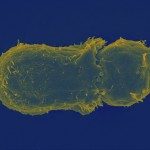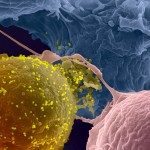Lien vers Pubmed [PMID] – 16713973
Immunity 2006 May;24(5):547-61
HIV-1-infected lymphocytes improperly respond to T cell antigen receptor (TCR) stimulation. To document this phenomenon, we studied the capacity of HIV-1-infected lymphocytes to form immunological synapses. We show here that HIV-1-infected T cells poorly conjugated with antigen-presenting cells, and when they formed conjugates, the synapses were abnormal. TCR and Lck accumulated in the recycling endosomal compartment, and their clustering at the synapse was severely reduced. These phenomena were, to a large extent, caused by Nef, a viral protein affecting intracellular trafficking and signaling pathways. Concomitantly, in HIV-infected cells, tyrosine phosphorylation at the synapse and the patterns of tyrosine phosphorylated proteins were disturbed in a Nef-dependent manner. These findings underscore the importance of Lck and TCR endosomal trafficking in synapse formation and early T cell signaling. Alteration of endocytic and signaling networks at the immunological synapse likely impacts the function and fate of HIV-1-infected cells.




